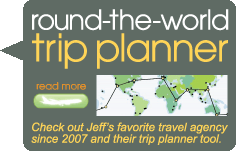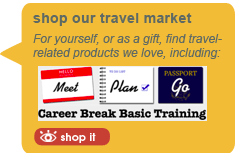
At a protest in Buenos Aires. Copyright CareerBreakSecrets.com
How to stay safe while traveling around the world on your career break is something we all think about. For some, it can cause paralytic fear, but for most dealing with safety issues is a matter of preparation, making smart decisions, becoming more comfortable with the world as you find it and learning as you go, from your own travel experiences and from other travelers. Smarter travel is possible in this case to help avoid getting into nasty situations.
In January at the Year Out Expo, I met fellow speaker Charlie McGrath. He runs Objective Travel Safety, an organization that helps train all types of people and organizations on how to be safe while abroad and how to respond in case there is a crisis. I had the chance recently to talk to Charlie about staying safe while traveling on a career break.
1. Do you have an overall philosophy about how travelers should approach safety to plan properly?
Researching their destinations is the key, the need to understand enough about the culture, environmental issues( earthquakes etc) crime rate etc so they can ‘aim off’ and so avoid trouble.
2. What’s the scariest safety situation you’ve been in or been called to help with?
I was hijacked at gunpoint in Iraq which wasn’t too good! But cooperated and therefore survived.
3. For people thinking about taking a career break to travel the world, what are the biggest safety or security issues that are most likely to face?
Crime and road traffic accidents are the big 2 with disease/illness some way behind.
4. What are the concerns that people typically have about traveling the world that are least likely to happen?
Getting blown up or kidnapped. Its inevitable that the threat of terrorism dominates the media but the reality is very different. India is a good example, remember the Nov 2009 Mumbai bombing- huge headlines, 180 odd people killed but on average 250 die on India roads every day!
5. What are the biggest safety mistakes that career breakers tend to make while traveling?
Difficult question! I suppose being too worried about safety and not exploring enough, in general terms the further off the beaten track you go often the safer you are,
6. Are there some steps you can take before you leave that are either preventative or can help you in case something does happen while you’re traveling?
Yes many. Acknowledge that crime and road traffic accidents will be greatest threat and prepare. Know where the crime areas are, travel with a mixture of money- casdh, cards, possibly travelers cheques and expected to be mugged at some stage. There only go out with what you need, some cash perhaps one card and leave rest behind in hotle safety deposit box or with host. If you get mugged you just hand over enough to satisfy aggressor (having a reserve in a shoe or bra is also handy. Wear a seat belt at every opportunity.
7. When I was traveling around, I noticed that as my confidence as a traveler grew, my fears of something bad happening dropped. Is that normal or had I lulled myself into a false sense of security?
No I would say this is normal and looking confidence is good (but not over confident). To avoid crime there are 3 key things; lower your profile (rings/watches off), Be aware( know where the dodgy parts of town are) & look confident.
8. There are any number of products being sold out claiming to help you keep yourself and your things safe. To me many of them seem unnecessary and a waste of money. Are there any that you recommend that really are worth buying?
I agree. A couple of padlocks are useful to hotel/hostel lockers, a door guard/wedge can be handy to stop unwanted visitors in the night- amazing how many female report the hotel heating engineer needing to check their radiator at 2 am.
9. Given the role that the internet plays in helping the traveler do research, stay in touch with friends and family, bank, etc., what tips do you have for people to help keep their personal information safe and secure while traveling?
If possible get money transfers done by a friend or relation at home rather than internet café. Travel money credit cards such as Caxton FX (separate from you bank accounts) are good.
10. Staying healthy and not getting sick on the road is a concern for all travelers. Is there a basic first aid kit you recommend for travelers? What types of medicines should travelers just buy on the road?
A simple travel pack is good but do take some antiseptic cream, oral rehydration salts if you get the runs. Ciprofloxacin is a good broad based antibiotic. Be very careful buying anti malaria tablets abroad, especially if they seem too cheap, too many counterfeit drugs around. ,
11. What is your take on the US, UK and other governmental safety warnings?
Are they really useful to travelers? I ask because in my opinion, they seem to cast countries in very black and white terms – safe or not safe – with no room for nuance. Or, am I just cynical? I do think they are a good starting point as many travelers will do very little research. Yes they may over stress risks but I find the Brit FCO always has some useful advise.
12. What are some of the things you personally do or pack to help you be better prepared while traveling?
I always take a head torch – vital, hand gel to keep hands clean/reduce disease threat & know what the local passionate sport so I can chat to taxi drivers & hotel staff.
12. Finally, what are your favorite places to travel that are a bit off the beaten track?
Romania, was N Pakistan but probably too dangerous now, Chile.
About Charlie:

Charlie McGrath
Charlie McGrath spent 15 years as an Army Officer. He spent five years on operations in Northern Ireland but also saw service in Central America, Southern Africa and during the First Gulf War. He was awarded the MBE for his work in South Africa during the country’s first democratic elections in 1994. Prior to joining the army he spent a year traveling in South America and has traveled widely thereafter. His company, Objective Travel Safety, provides safety training to a range of clients including journalists and NGOs operating in hostile environments, business professionals and young students travelers embarking on their Gap Year. Objective also provided the training to Ewan McGregor & Charlie Boorman prior to their ‘Long Way Round’ and ‘Long Way Down’ motorbike adventure. When possible he continues to travel whenever possible. During his time in the army led an expedition across the Sahara desert, spent his honey moon in Papua New Guinea. His second gap year was in India, Pakistan, Burma & Thailand and more recently has travelled in Malawi, Zambia, Romania, Laos, Thailand, the Lebanon and Israel.
Tags: career break advice, smarter travel, travel advice, travel safety





